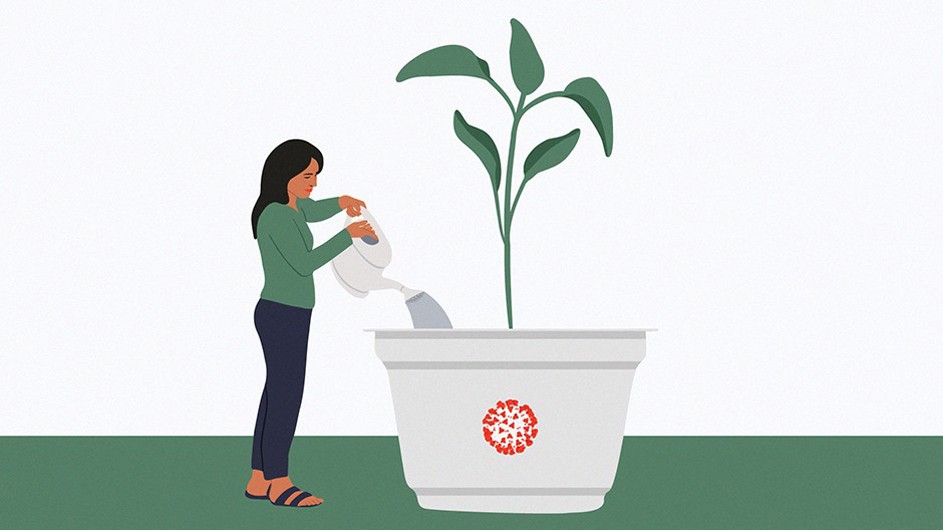COVID-19 Taught Me that Actions Really Do Matter
Through sustainability efforts, we raised thousands of dollars for the workers of Bhopal and transformed government policy for the greater good.

This is part of a Columbia News series, titled Lessons Learned, which invites the Columbia community to reflect on the pandemic and the insights they have gained from their COVID-19 experience. These essays speak to the innovation, creativity and resourcefulness we have witnessed during this period of unprecedented challenge, as well as some of the silver linings in the actions we have had to take by necessity.
As the government began to lift travel restrictions imposed in March, millions of jobless workers took to the roads in India, making their way back from cities to their rural villages. In my hometown of Bhopal, my sister Pooja had formed a citizens collective to feed these interstate travelers, who rode on bicycles and in crowded buses and walked for thousands of miles. It was a scorching 45-degree centigrade and a bottle of cold water with some rice and dal cooked in a community kitchen was a welcome respite.
At one point, I refer to these wayfarers as migrants, but my sister corrects me. “They are not migrants,” she tells me. “We have made them into migrants.” Pooja needed funds so that she could continue driving her community kitchen on wheels, along with Goldie, Mita, Sparsh and other volunteers.
Back at home in Millburn, New Jersey, the Climate Action group had been spreading its sustainability agenda. Kumkum Srivastava, one of the inspiring leaders in the group, began offering our neighbors sustainability tips via video. Her kitchen produces no waste. We were intrigued. I have a composter at home, and I compost diligently. But zero waste has been only an aspirational goal for me. We (60 families) were eager to learn how to better manage our kitchens. Spring was peeping through our windows with magical flowers, but we were confined to homes and our yards.
Meanwhile, Kumkum had taken sustainability to another level, removing the seeds from tomatillos, peppers and cilantro from her kitchen waste and planting them in small pots. She would show us on many Zoom calls the seeds that now sprouted into saplings. She used her kitchen scraps as manure for the saplings.
I spent hours talking with Kumkum on the phone about the problems we witnessed around us. One day, she texted me that she would like to do a plant sale for the troubled travelers passing through Bhopal. My sister’s needs had multiplied four times by now as the influx of itinerant workers continued to grow. They needed soaps, toothpaste, toothbrushes, sandals, hand towels and lots of food.
We decided to combine our passion for zero waste and sustainable lifestyle to raise money for the COVID-19 relief in Bhopal. Kumkum and I quickly created a flyer: 100% of Sales Go Toward the Bhopal COVID-19 Relief. Kumkum started to plant more saplings—cucumbers, cilantro, mint, tomatillos, tulsi and small chillies, all advertised in our flyer. Plants for sale included saplings from the seeds in my friend’s kitchen.
Kumkum, an IT professional, started spending her evenings and weekends tending to her nursery. We set the price at $10 per plant, and many neighbors ordered. Yes, expensive, but the plant was just a token; the actual reason for their generosity was charity. Of course, everything had to be sustainably green. We needed packaging to grow the plants and provide as takeaways, so we created another flyer to ask Chobani lovers to donate their containers.
We were moved by the number of residents who chose to drop off containers rather than toss them in the recycling bin. Kumkum also created videos for customers on how to plant the saplings in their homes. Our plant sale drive became so popular that we were getting orders from towns nearly 20 miles away.
Back in Bhopal, news of our fundraiser spread. The Municipal Corporation of Bhopal (equivalent to a city town council) heard about the green initiative. On World Environment Day (June 5), Bhopal’s city government announced its own green drive. Inspired by our model, residents were asked to use their recyclable containers to grow plants, and government workers have placed these plants all over the city.
The pandemic, as difficult and tragic as it has been, and still is, has taught me a lesson, both valuable and hopeful. I learned it is possible to penetrate bureaucracy on issues of sustainability, and that individual actions can lead to policy changes. We need to keep doing our bit. In my household, Chobani containers no longer land in our recycling bin. I have another purpose for them.
Radhika Iyengar is a research fellow at the Center for Sustainable Development, Earth Institute.